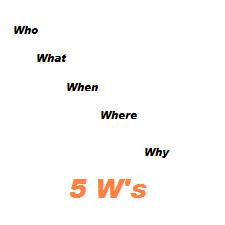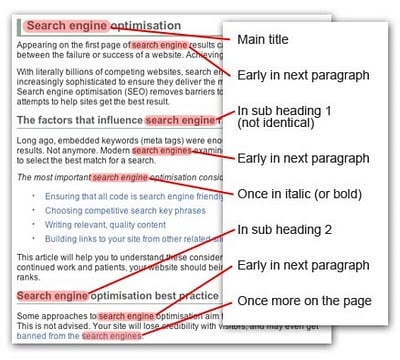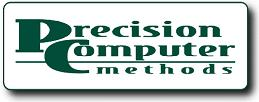____________________________________________________________
A great low cost tool to get more Web Traffic
Posted by Peter Heinicke on Mon, Oct 29, 2012 @ 03:36 PM
Tags: Inbound Marketing, SEO, link building, facebook marketing
Editor's Note: This article will be first in a series of 14 reprinted articles on web optimization. To get the remaining articles, please sign up for this blog in the box at the left. The first (and maybe the second article) will be published by email. The rest, just through normal blog publishing.
Tags: Inbound Marketing, SEO, Website Traffic, Web Optimization, Keywords
In the past several weeks, we have covered the content requirements in order to develop your website as an authority in your field. While this makes sense, sometimes it is difficult to get a handle on how to approach this task of creating perfect content that is appealing to your viewers and at the same time, attractive to the search engines. As a suggestion for organizing your thoughts about content, think of the 5 W's: Who, What, When, Where, Why. When you can answer the 5 W questions, you have covered your content needs. Let's look at the 5 W's individually.
Tags: SEO | organic search | Paid Search, Inbound Marketing, 5 W's, SEO, Search Engine Optimatization, SERP, SEO Authority, Content based Marketing
- Provide relevant and substantial content. We have already discussed how content is King and keywords are the Queens. Just throwing keywords at a page without thoughtful content may get people to your site as a result of a keyword search; however, if your page visitor doesn’t find something of value at that website, they will leave as quickly as they came. And if they clicked on one of your Google AdWords ads, you have just paid for that useless visit with nothing to show for it.
- Google also suggests:
The page should contain information that is useful and accurate about the product or services searched. - If your landing page is not relevant to the keyword searched, it will be viewed as a waste of time and the viewer will flash away hoping to find what they want on someone else’s page.
- Provide information that is relevant and useful before you require them to subscribe or register. If the pre-register content has value, they will be eager to register to get more. Lay those crumbs out there clearly on the path to commitment to your site. After all, asking a viewer to register or subscribe isn’t really free. The price is their name and email address.
- Keep your ads, banners and affiliate links to a normal non-overloaded minimum. When a viewer arrives at a page filled with loads of ads and little content, off they scamper. You see, “It’s all about me,” the viewer says. The viewer isn’t arriving at your website with the intention of making you money, but to find answers to their questions or solutions to their problems. Don’t saturate them with ads.
- Your content must be unique. If your page mirrors 100 other web pages on the Internet, why would someone choose you over the others or ever consider you an authority? The importance of this non-mirrored content has to be handled delicately if you write and publish articles. [More on this topic in a later lesson.]
- Avoid misleading your visitors by providing exactly what you ad stated. No loss-leaders here. That tactic may work at a grocery store, but it can keep people from ever coming back to your website.
- Honor your deals and deliver as promised. In fact, the most successful businesses, either online or offline, make their offer, then over-deliver. Think in terms of delivering over and above what you offer and you will distinguish your business in the eyes of your customers. They will come back again and again. Remember, the first sale is not the business-building sale. It is the second, the third and fourth sales that make your business a success.
- Treat your customers well by protecting their information responsibly. Just as you would want your personal information managed correctly, so should you be able to insure that your privacy policy is clearly stated, and more importantly, clearly followed. Google’s guidelines seem to be reflective of common sense, yet too many web owners forget these details and send up either abusing or neglecting that ever-important component to their business: the customer.
Tags: targetted Marketing, Inbound Marketing, Website Traffic, Web Optimization, Elburn SEO
We have now captured the attention of our viewer by telling them clearly the benefits of what we offer. They like what they see and they want more. How you present that "more" is very important to keeping your visitor around long enough to respond to your Call to Action (more on Call to Action in a later lesson). Think of a website navigation scheme as a pyramid where the information offered is more specific and succinct at the top of the pyramid and becomes broader and deeper as you delve further into the website. The information is more complete and offers a greater explanation of the topic pursued as you go further down the pyramid and deeper in the navigation. This allows the visitor to decide how much they want to pursue, rather than having to slog through too much or more information than they want too soon. Most newspaper articles and press releases are written like this.
Tags: Inbound Marketing, Website Traffic, Website Navigation, Web Optimization
After selecting a series of keywords that your potential customer will use to find your website, you need to focus on those keywords as part of your web page content. If you have several keywords, you may want to have a web page that focuses specifically on that keyword. For example, let's say your keywords are:
- meditation tool
- habit control
- focusing tool
- relaxation
- learn to meditate
- how to meditate
- meditation supplies
By focusing on each of these words with a page that corresponds to
the keyword phrase and hitting an appropriate keyword density ratio - somewhere between 3% and 7% is often considered a good range - you assist the search engines in finding your page for those keywords. However, if you exceed the keyword density by too much, the search engines will probably consider your site to be artificially stuffed and penalize your website. So you need to watch carefully how your keywords are dispersed. It is not just the keyword density that is important but also the placement and usage of those keywords. It is important that your keywords appear in the following locations:
- Page title
- Meta tags
- Very early in the website in a <H1> heading tag
- Within the first 10 to 20 words of the first paragraph
- Bolded within the body content
- Alt tags on your images
If you find your competitors' website consistently placing higher than your website on a search for your keywords, it is likely that your website is not utilizing these keyword positioning tactics. Remember that in Lesson #1, we emphasized that it is all about keywords. Keywords are the crumbs that lead your customers to your website. Those crumbs have to be well-placed on your web pages so that the search engines can create the trail to your website for your potential customers. The only reason the search engines will create that trail to your website is if your web design illustrates to the search engines that you are an authority for that keyword phrase. More about creating authority in Lesson #3.
Your assignment this week is to review your website for keyword placement to see if you can improve the way your content is displayed. Look for your keywords on each page and determine whether you are trying to place too many keywords on one page thereby diluting the keyword density. If that is the case, consider breaking your content into separate pages that will be more easily found by the search engines.
Tags: Inbound Marketing, SEO, Website Traffic, Web Optimization, Keywords







